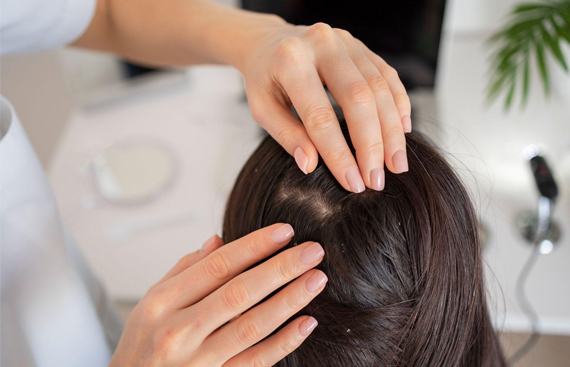Gut Health and Dandruff: Decoding the Ultimate Connection

There is no doubt about the fact that dandruff, a well-known scalp problem, affects millions of people around the globe. The condition is characterised by itchy, flaky skin known as dandruff on the scalp, which can undermine anyone’s self-confidence. The most common view amongst people is that dandruff has nothing to do with gut imbalance, and the main reasons for dandruff are external factors like poor hygiene and dry scalp. However, you might be surprised to know that there can be a connection between gut health and dandruff. Not many might be aware that a gut test can check for any imbalance of the stomach microbiome which might be the main reason behind dandruff and other skin complications.
So, in this blog, we decode the surprising link between dandruff and gut health, in addition to exploring how imbalances in the microbiome can cause dandruff and acne. We'll also discuss the importance of practising preventive measures like regular stool sample testing and stool culture test. These can provide essential insights into your gut's health, allowing you to make necessary dietary modifications and treat dandruff.
Contribution of Gut Microbiome in Promoting Health
For those unknown, the gut microbiome is a diverse community of microorganisms residing in your gastrointestinal tract. They are responsible for diverse functions such as nutrient absorption, digestion, immune functioning, as well as mood regulation.
It is also not unknown that if the population of these microorganisms is disturbed, it can cause adverse impacts on your health, which also includes skin and hair health. The gut-skin axis, as a bidirectional communication system, reflects the very dynamic of these two organs.
Exploring Connection Between Dandruff and Gut Health
Now that we have a fair idea about gut microbiome, let’s decode the link between gut health and dandruff. One of the causes can be inflammation. Chronic inflammation in the gut interferes with the barrier integrity of the intestines, resulting in increased permeability or "leaky gut." This means toxins, bacteria, and other hazardous substances can enter the bloodstream and produce systemic inflammation, often associated with skin conditions including dandruff. If your doctor feels that this is the case, he may suggest stool sample testing to confirm the same.
Another condition, microbial dysbiosis - wherein microbiome composition is imbalanced, has been considered an essential factor in dandruff development. Changes in the gut flora structure are capable of regulating the immune system and induce inflammation, both of which could be found in dandruff, causing skin problems.
Ensuring Gut Health for a Healthy, Dandruff-free Scalp
Gut health can be improved by following certain dietary recommendations, thereby paving the way for a healthy scalp.
Dietary Recommendations
- Prebiotic Foods: Prebiotic foods like onion, garlic, asparagus, leek, banana, and chicory root, which are essen- tial probiotic nutrients, can be used as gut-microbiome fuel.
- Anti-Inflammatory Foods: Consume an anti-inflammatory diet, which is rich in fruits, vegetables, whole grains, nuts, seeds, and spices including turmeric and ginger. Cut down processed food and trans fats, which are well-known to aggravate inflammation.
- Omega-3 Fatty Acids: A great way to include omega-3 fatty acids is through consuming fish, flax seeds, chia seeds, and walnuts. These anti-inflammatory nutrients are highly beneficial for promoting gut and skin defence mechanisms.
- Probiotic-Rich Foods: Make sure to consume probiotics such as yoghurt, kefir, kombucha, and fermented vegetables. These foods restore a healthy level of good bacteria in the gut by fostering balance.
- Hydration: Consume an adequate amount of water every day to stay hydrated. Drinking enough water helps not only digestion but also improves skin health.
Lifestyle Interventions: Apart from dietary interventions, certain lifestyle changes also help promote gut microbiome
- Regular Exercise: It is always beneficial to indulge in regular physical activity to boost bowel movements while promoting blood circulation and alleviating stress, all of which will aid in having a healthy scalp and gut.
- Stress Management: Do meditation, deep breathing exercises, and yoga for minimising the effect of stress on gut health and dandruff.
- Adequate Sleep: Ensure you get 7-9 hours of uninterrupted sleep at nights to benefit your gut by offering the body adequate time to rest and repair.
- Avoiding Triggers: Make sure to get rid of things that can worsen dandruff, like harsh hair products, heat styling, and allergens.
- Scalp Care: Opt for gentle shampoo and conditioner that is sulphate-free. Do scalp massages regularly to promote blood circulation and moisture.
Above-mentioned factors help regulate digestion, support immune function and promote detoxification, thereby contributing to healthy skin.
Why is it Vital to Consult Medical Professionals
Dietary changes and lifestyle modifications are sure to provide great help, but at times, it might be vital to get a medical consultation. A healthcare professional will make a customised plan if the dandruff issue remains unresolved in spite of changes and modifications. You may also be prescribed certain tests and investigations, like stool sample testing and stool culture test, certain medications, or specialised skincare products.
Need for Stool Sample Testing/Stool Culture Test
If you want to know more about your gut health, make sure to go for stool sample testing or stool culture test. These tests can examine any imbalance of the gastrointestinal microbiome that might be responsible for dandruff and other skin complications.
Conclusion
So, as we have seen, there is a significant connection between dandruff and gut health. Through dietary and lifestyle interventions, individuals can enhance their gut microbiomes, which in turn helps create optimal skin health and reduce the occurrence of dandruff. It is also essential to remember that consulting with medical professionals can provide insights and personalised recommendations for managing dandruff and promoting overall well-being.
Read More News :



